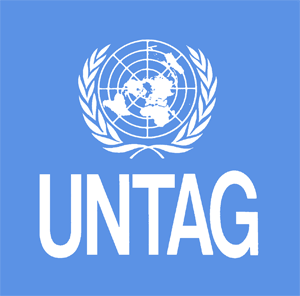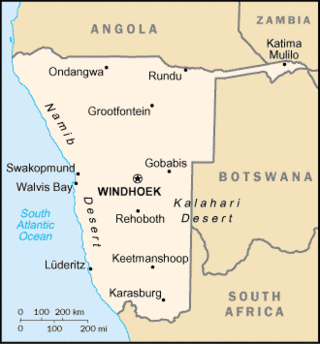
South West Africa was a territory under South African administration from 1915 to 1966, and under South African occupation from 1966 to 1990. Renamed Namibia by the United Nations in 1968, it became independent under this name on 21 March 1990.

The United Nations Transition Assistance Group (UNTAG) was a United Nations (UN) peacekeeping force deployed from April 1989 to March 1990 in Namibia, known at the time as South West Africa, to monitor the peace process and elections there. Namibia had been occupied by South Africa since 1915, first under a League of Nations mandate and later illegally. Since 1966, South African forces had been combating an insurgency by the People's Liberation Army of Namibia (PLAN), the military wing of the Namibian-nationalist South West African People's Organization (SWAPO). The UN Security Council passed Resolution 435 in 1978, which set out a plan for elections administered by South Africa but under UN supervision and control after a ceasefire. However, only in 1988 were the two parties able to agree to a ceasefire. As UNTAG began to deploy peacekeepers, military observers, police, and political workers, hostilities were briefly renewed on the day the transition process was supposed to begin. After a new round of negotiations, a second date was set and the elections process began in earnest. Elections for the constitutional assembly took place in November 1989. They were peaceful and declared free and fair; SWAPO won a majority of the seats. The new constitution was adopted four months later and it was followed by Namibia's official independence and the successful conclusion of UNTAG.

Louis Alexander Pienaar was a South African lawyer and diplomat. He was the last white Administrator of South-West Africa, from 1985 through Namibian independence in 1990. Pienaar later served as a minister in F W de Klerk's government until 1993. He married Isabel Maud van Niekerk on 11 December 1954.

United Nations Commissioner for South West Africa was a post created by the United Nations General Assembly (UNGA) in 1966 to assert the UN's direct responsibility for South West Africa which was then under illegal occupation by apartheid South Africa.

United Nations Security Council Resolution 435, adopted on September 29, 1978, put forward proposals for a cease-fire and UN-supervised elections in South African-controlled South West Africa which ultimately led to the independence of Namibia. Importantly, it established the United Nations Transition Assistance Group (UNTAG) which oversaw the election and the South African withdrawal.

The Transitional Government of National Unity (TGNU), was an interim government for South West Africa (Namibia) between June 1985 to February 1989.
The 1978 Settlement Proposal in Namibia, devised by the Contact Group of Western States, mandated the United Nations Transition Assistance Group (UNTAG) under United Nations Security Council Resolution 435 to assist a UN Special Representative appointed by the UN Secretary-General 'to ensure the early independence of Namibia through free and fair elections under the supervision and control of the United Nations'.

United Nations Security Council Resolution 385, adopted unanimously on January 30, 1976, recalled previous resolutions on the topic as well as an advisory opinion of the International Court of Justice that South Africa was under obligation to withdraw its presence from the Territory of Namibia. The Resolution reaffirmed the United Nations' legal responsibility over Namibia, expressed its concern over the continued illegal actions of South Africa and deplored the militarization of Namibia.

United Nations Security Council Resolution 387, adopted on March 31, 1976, reaffirmed the principle of a state's right to territorial integrity in the face of South African incursions into Angolan territory. The Council recognized the international disturbance at South Africa's actions and expressed its concern over them. The Resolution condemned South Africa's actions and demanded that it respect the territorial integrity of Angola. The Council further demanded that South Africa desist from using the "international Territory of Namibia" to mount provocative or aggressive acts against other states and called upon the South African government to meet Angola's just claims for compensation.

United Nations Security Council Resolution 393, adopted on July 30, 1976, after a letter from a representative from Zambia, the Council condemned a recent attack by South Africa in Zambian territory, resulting in the destruction of property and loss of life. The resolution went on to express concern at South Africa's occupation and use of South West Africa as a base for attacking neighbouring African countries, and that the continuation of this would constitute a threat to international peace and security.

United Nations Security Council Resolution 428, adopted unanimously on May 6, 1978, after hearing representations from the People's Republic of Angola, Zambia and the South West Africa People's Organisation (SWAPO), the Council reminded Member States to refrain from using threats and use of force in their international relations. Reiterating Resolution 387 (1976), the present resolution condemned South Africa for its armed invasion of Angola via South West Africa (Namibia).

United Nations Security Council Resolution 431, adopted on July 27, 1978, after recalling resolution 385 (1976), the Council took note of a proposal of a solution to the situation in Namibia and asked the Secretary-General to appoint a Special Representative for Namibia to ensure the independence of Namibia from South Africa as soon as possible. It also called on all concerned to exert their best efforts to resolve the issue, so that free and fair elections could be held.

United Nations Security Council resolution 447, adopted on 28 March 1979, after hearing representations from the People's Republic of Angola and the South West Africa People's Organisation (SWAPO), the Council recalled resolutions 387 (1976) and 428 (1978) and condemned South Africa for its continuing raids in direct violation of prior resolutions.

United Nations Security Council resolution 454 was adopted on 2 November 1979. After hearing representations from the People's Republic of Angola, the Council recalled resolutions 387 (1976) and 447 (1979), noting its concern and condemned the continuing attacks on the country by South Africa through illegally-occupied South West Africa.

United Nations Security Council resolution 532, adopted almost unanimously on 31 May 1983, after hearing a report from the Secretary-General and reaffirming resolutions 301 (1971), 385 (1976), 431 (1978), 432 (1978), 435 (1978) and 439 (1978), the Council condemned South Africa's continued occupation of Namibia, then known as South West Africa. All voted in favour other than France, who abstained.

United Nations Security Council resolution 539, adopted on 28 October 1983, after hearing a report from the Secretary-General and reaffirming resolutions 301 (1971), 385 (1976), 431 (1978), 432 (1978), 435 (1978), 439 (1978) and 532 (1983), the council condemned South Africa's continued occupation of Namibia, then known as South West Africa, and the tension and instability prevailing in southern Africa as a result.

United Nations Security Council resolution 566, adopted on 19 June 1985, after recalling resolutions 269 (1969), 276 (1970), 301 (1971), 385 (1976), 431 (1978), 432 (1978), 435 (1978), 439 (1978), 532 (1983) and 539 (1983), the Council expressed concern at the tension and instability caused the continued occupation of Namibia by South Africa, noting the apartheid policies implemented in the territory and that the territory was used as a springboard for attacks on other southern African countries.

United Nations Security Council resolution 601, adopted on 30 October 1987, after recalling resolutions 269 (1969), 276 (1970), 301 (1971), 385 (1976), 431 (1978), 432 (1978), 435 (1978), 439 (1978), 532 (1983), 539 (1983) and 566 (1985), the council again condemned South Africa for its continued "illegal" occupation of Namibia and its refusal to comply with previous resolutions.

United Nations Security Council resolution 629, adopted unanimously on 16 January 1989, after recalling resolutions 431 (1978), 435 (1978) and 628 (1989), the council noted that the parties to the Brazzaville Protocol agreed that 1 April 1989 be established as the date of the South African withdrawal from Angola and therefore lead the way to the independence of Namibia.

United Nations Security Council resolution 643, adopted unanimously on 31 October 1989, after reaffirming resolutions 435 (1978) and 629 (1989), 632 (1989) and 640 (1989), as well as noting a report by the Secretary-General Javier Pérez de Cuéllar, the council expressed its full intention to implement Resolution 435 of 29 September 1978 regarding the situation in Namibia.







